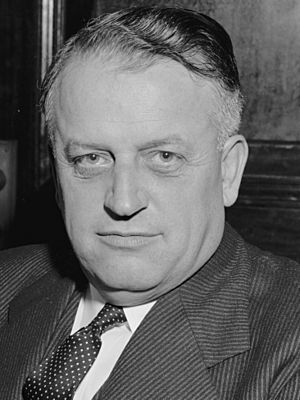Kenneth S. Wherry facts for kids
Quick facts for kids
Kenneth Wherry
|
|
|---|---|
 |
|
| 4th Senate Minority Leader | |
| In office January 3, 1949 – November 29, 1951 |
|
| Deputy | Leverett Saltonstall |
| Preceded by | Alben W. Barkley |
| Succeeded by | Styles Bridges |
| Leader of the Senate Republican Conference | |
| In office January 3, 1949 – November 29, 1951 |
|
| Deputy | Leverett Saltonstall |
| Preceded by | Wallace H. White |
| Succeeded by | Styles Bridges |
| Senate Majority Whip | |
| In office January 3, 1947 – January 3, 1949 |
|
| Leader | Wallace H. White |
| Preceded by | J. Lister Hill |
| Succeeded by | Francis J. Myers |
| Senate Minority Whip | |
| In office January 3, 1943 – January 3, 1947 |
|
| Leader | Charles L. McNary Wallace H. White |
| Preceded by | Felix Hebert (1935) |
| Succeeded by | Scott W. Lucas |
| United States Senator from Nebraska |
|
| In office January 3, 1943 – November 29, 1951 |
|
| Preceded by | George W. Norris |
| Succeeded by | Fred Seaton |
| Personal details | |
| Born | February 28, 1892 Liberty, Nebraska, U.S. |
| Died | November 29, 1951 (aged 59) Washington, D.C., U.S. |
| Political party | Republican |
| Spouse | Marjorie Colwell |
| Children | 1 son 1 daughter |
| Education | University of Nebraska, Lincoln (BA) Harvard University |
| Military service | |
| Allegiance | |
| Branch/service | |
| Years of service | 1917–1918 |
| Unit | Flying Corps |
| Battles/wars | World War I |
Kenneth Spicer Wherry (February 28, 1892 – November 29, 1951) was an American businessman, lawyer, and politician. He was a member of the Republican Party. Wherry served as a U.S. Senator for Nebraska from 1943 until his death in 1951. For his last two years, he was the minority leader in the Senate.
Contents
Early Life and Education
Kenneth Wherry was born in Liberty, Nebraska. He was the third of five children. He went to public schools in Pawnee City.
Wherry graduated from the University of Nebraska–Lincoln in 1914. Later, he studied business at Harvard Business School from 1915 to 1916. During World War I, he served in the U.S. Navy Flying Corps from 1917 to 1918.
After his military service, Wherry started several businesses. He sold cars, furniture, and livestock. He also became a licensed undertaker. Wherry studied law and became a lawyer. He opened his own law practice in Pawnee City.
Political Career Highlights
Wherry began his political journey in Pawnee City. He served on the city council in 1927 and 1929. He was also the mayor of Pawnee City from 1929 to 1931. At the same time, he was a member of the state senate from 1929 to 1932.
He ran for governor in 1932 but did not win the Republican nomination. In 1934, he also ran for U.S. Senator but was unsuccessful.
In 1938, Wherry was elected mayor of Pawnee City again. He served until he moved to Washington D.C. to become a U.S. Senator. He led the Nebraska Republican Party from 1939 to 1942. He also worked for the Republican National Committee.
Serving as a U.S. Senator
In 1942, Kenneth Wherry was elected to the U.S. Senate. He won against the person who was already in office, George W. Norris. He was reelected in 1948. Wherry served as a Senator until his death in 1951.
He held important leadership roles in the Senate. He was the Republican whip from 1944 to 1949. From 1949 to 1951, he served as the minority leader. This meant he was the main leader for the Republican Party in the Senate.
Wherry often spoke about his views on international matters. He believed the United States should focus more on its own country. He was against the U.S. fully joining the United Nations in 1945. He also opposed giving loans or aid to countries in Europe.
He was concerned that American aid might accidentally help the Soviet Union. Wherry also supported laws to build housing for military families. This was important after World War II when there was a shortage of homes.
Wherry was a strong opponent of President Harry Truman's policies. He was especially against the Marshall Plan. This plan aimed to help rebuild Europe after the war. Wherry thought it would be a waste of money. However, Congress approved the Marshall Plan to help stop economic problems and Soviet expansion.
Visiting Buchenwald Concentration Camp
On April 11, 1945, American forces freed the Buchenwald concentration camp. This camp was built in 1937 and many people died there. General Eisenhower wanted American lawmakers to see the terrible conditions.
Kenneth Wherry was part of a group of U.S. legislators who visited Buchenwald. They went to inspect the camp and understand the horrors of the Nazi actions. The group included other senators and journalists. Their visit helped show the world the terrible things that happened there.
Death
Kenneth Wherry died in Washington, D.C., in 1951. He was 59 years old and was still serving as the Republican Floor Leader. He had surgery a few weeks before and felt ill. He was taken to George Washington University Hospital. He passed away from pneumonia several hours later.
His Senate seat for Nebraska saw many changes after his death. Six different Senators held the seat between 1949 and 1955.
See also
- List of United States Congress members who died in office (1950–99)
Images for kids


